Good Health
Advancing Public Health
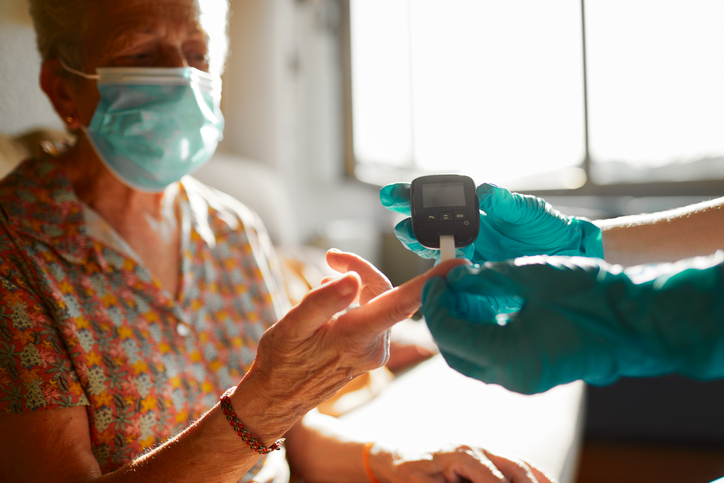
The U.S. Centers for Disease Control and Prevention (CDC) has a broad and complex public health mandate. What may seem like disparate health issues are connected in ways that are not always apparent. While COVID-19 is an infectious disease, for example, it has connections with non-infectious diseases like diabetes and the opioid epidemic. Indeed, as the COVID-19 pandemic worsened, the resulting mental health crisis contributed to a record 107,000 drug overdoses in the U.S. in 2021. Meanwhile, diabetes accounted for more than 100,000 deaths in 2021 and contributed to COVID-19 mortality, since diabetes makes COVID-19 patients more vulnerable to severe health outcomes.
As CDC tackles its public health mission, Abt Global equips the agency with tools and data to inform decision making and drive public awareness and behavior change. We’ve helped CDC understand COVID-19 from its start and have provided strategic support for years on a wide range of issues, from HIV to opioids to diabetes.
We helped draft opioid prescribing guidelines, collected data showing COVID-19 vaccine effectiveness, developed communications about Zika, and increased awareness of prediabetes risk. We provide CDC this critical support because we share a mission: saving lives and protecting the public’s health.
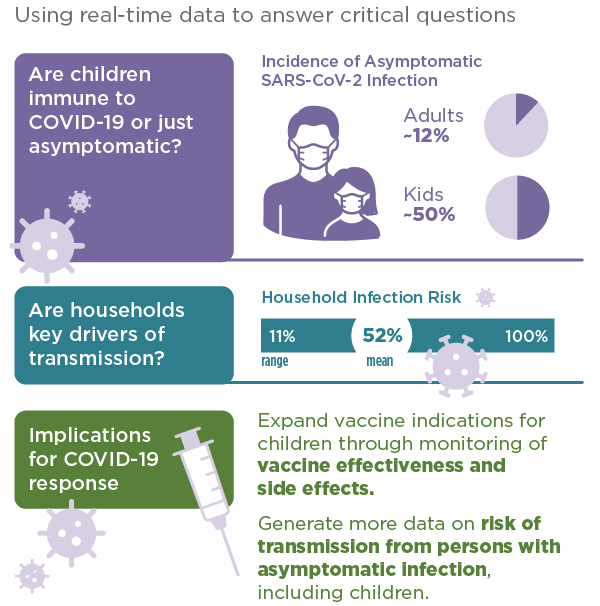
Real-time COVID-19 data power CDC insights
Our COVID-19 studies differ from the more common ones that use electronic medical records (EMR). The EMR studies include only people with symptoms who seek medical care. Our studies require participants to submit nasal swabs weekly, regardless of symptoms, and we analyzed a total of 250,000 swabs. That enabled us to, for example, capture mild or asymptomatic cases in children and conclude they were as vulnerable to COVID-19 as adults and play a role in transmission. Our data, which includes more than two billion data points, influence assessments of everything from vaccine effectiveness to disease transmission.
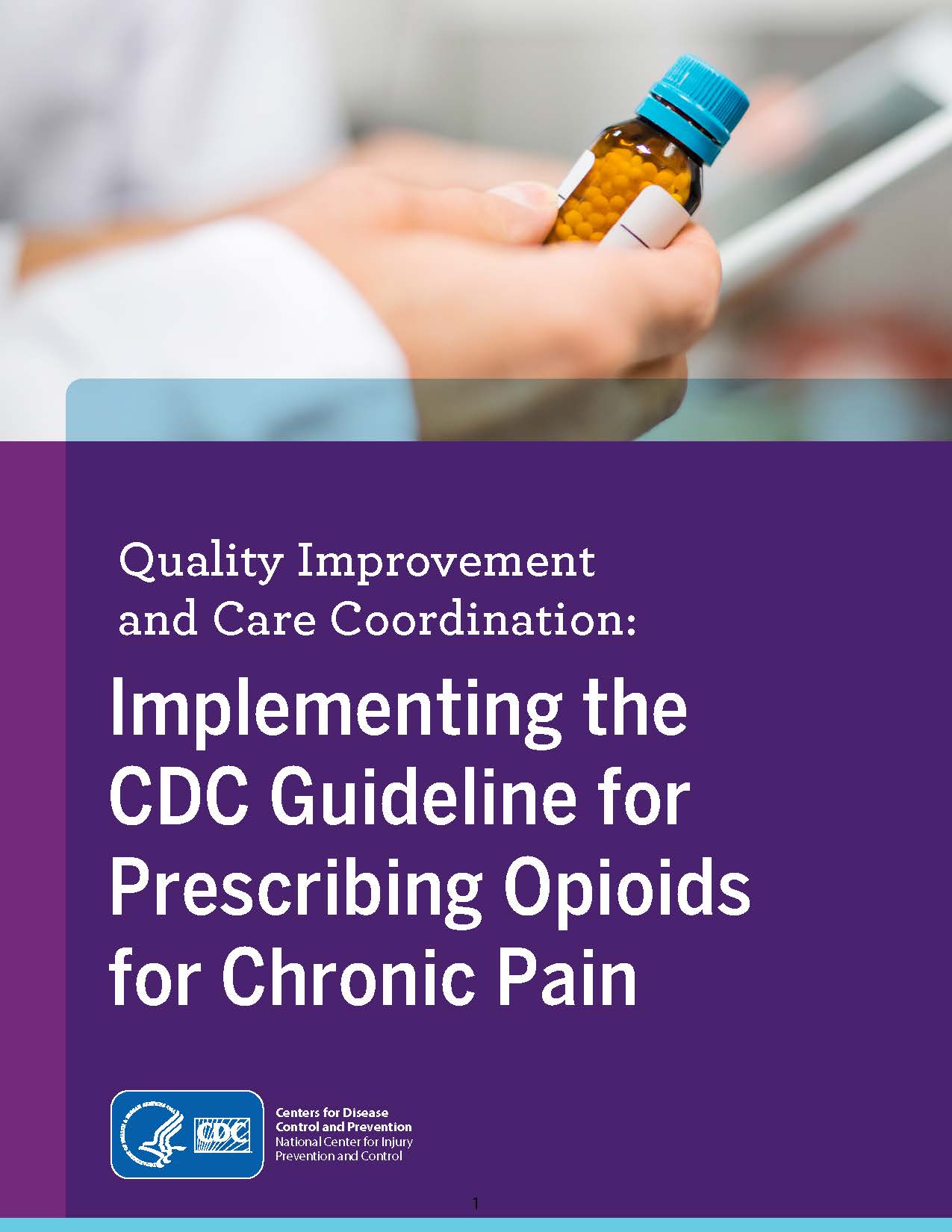
Opioid prescribing guidelines improve prescription practices
COVID-19’s links to a rise in mental health issues in the U.S. may be a contributing factor to the increase in opioid overdose deaths in the country. Abt has been at the forefront of CDC’s response to the opioid epidemic, from helping develop the 2016 Opioid Prescribing Guideline to supporting its implementation with quality improvement measures. We helped develop clinical decision support tools and facilitated learning collaboratives among those implementing the Guideline. We also evaluated the Guideline’s effect on key outcomes.
The Guideline played a key role in improving opioid prescription practices and has the potential to reduce deaths from prescribed opioids. Abt is currently partnering with CDC experts to evaluate the effect of implementing guidelines policies in health systems and examine opioid use disorder assessment and treatment. As the epidemic evolves, Abt will continue to support CDC as it provides ongoing support to health systems and communities to mitigate harm from the opioid crisis.
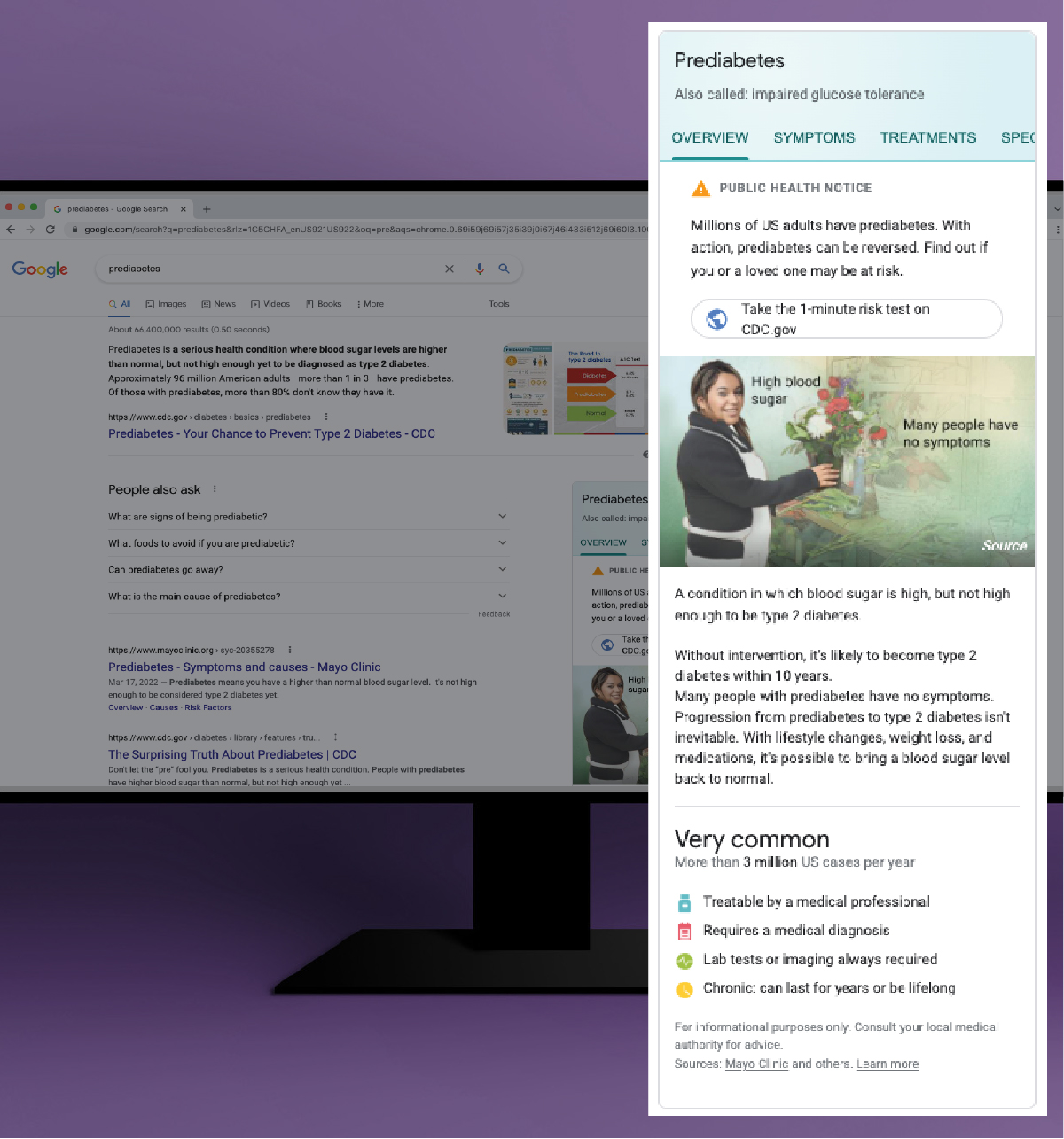
Digital ads drive diabetes awareness and prevention
Patients with diabetes are among the highest-risk groups for severe COVID-19. Nearly one third of the U.S. population—one hundred million people—have prediabetes (high blood sugar levels). This chronic health challenge is prevalent in all segments of society. CDC's priority is prevention, and a key program is the National Diabetes Prevention Program’s Lifestyle Change Program.
Delivering information to influence behavior change is key to affecting people’s lifestyles and preventing or managing chronic disease. Abt reaches people when they are most open to changing behavior, such as when they search online for diabetes information. Abt modified diabetes-related Google Health Cards, which pop up during online searches for diabetes or prediabetes. The modified cards “nudge” the person to a brief test on www.CDC.gov that assesses prediabetes risk. Over the four months following our modifications in 2018, average daily page views rose by 185 percent on CDC’s prediabetes web page and 276 percent on CDC’s Type 2 diabetes web page. The Health Cards continue to reach an estimated 17,500 users a day searching for Type 2 diabetes information and 98,000 searching for prediabetes.
CDC’s holistic view toward pandemics and epidemics is sound given how interrelated health challenges can be: reducing COVID-19 cases could decrease behavioral health disorders and drug overdoses, while curbing diabetes could lower COVID-19 deaths. Abt will continue to provide the information CDC needs to make public-health decisions that improve health outcomes in these and other critical areas.
PROJECT: Support Development of Opioid Prescribing Guidelines; Building a Behaviorally-Optimized Health Card for Type 2 Diabetes Prevention and the National Diabetes Prevention Program; Coronavirus Household Evaluation and Respiratory Testing (C-HEART)
CLIENT: U.S. Centers for Disease Control and Prevention (CDC)
![]()
Improving Delivery of Healthcare Services in the U.S.

Health disparities are endemic in the United States. Differential care received through the healthcare system plays a significant role, from prenatal services to infant nutrition to heart health later in life. Addressing structural inequities in the healthcare system can not only improve a person’s near-term health, but also have positive ripple effects in families for generations to come and through entire communities. At Abt, we deliver technical assistance (TA) and training to healthcare professionals to improve their delivery of healthcare services. The TA and training we provide promotes infrastructure improvements and practices that alert providers to unconscious biases so they can deliver equitable care for all patients. We are providing TA and training to more than 200 hospitals around the country on two topics: breastfeeding support and cardiac rehabilitation. The hospitals were selected based on patients they serve: large numbers of Medicaid patients and patients of color who experience lower rates of cardiac rehabilitation participation and lower breastfeeding rates.

EMPower Best Practices uses TA and skills-based competency training to improve evidence-based maternity care practices that enhance infant nutrition. We developed a virtual, culturally competent, interactive training program for frontline maternity care staff that complies with guidance from World Health Organization and the Baby Friendly Hospital Initiative. We also provide TA during training and for up to 18 months post-training as facilities implement new policies and practices. Over the next three years, we will train as many as 10,000 staff representing at least 80 percent of maternity care staff at these facilities.
As part of this work, we included a health equity component in the required training materials for all hospital trainers and staff. Before developing the materials, we met with health equity experts to gather feedback on barriers and equitable practices in the healthcare setting. Health equity experts also reviewed the materials before use, and the scenarios we used in training materials reflected patients’ racial, cultural, socioeconomic, and geographic diversity. We included a “reflections workbook or journal” for hospital staff to respond to tough questions in their equity journey. We also included quality improvement measures by race so that hospital staff can track their progress on key outcome measures and understand if they are closing the health equity gap at their facility.

AHRQ’s TAKEheart Initiative helps hospitals and health systems increase cardiac rehabilitation (CR) referrals, enrollment, and retention for eligible patients. We provide training and TA to promote hospital staff adoption of two evidence-based strategies: automatic referrals though electronic health records and care-coordination support to connect patients to CR programs and other resources.
Abt has recruited over 100 hospitals and health systems to participate in a 10-module virtual training series, which Abt created. The initiative aimed to develop, implement, and evaluate the evidence-based strategies. We also recruited a learning community of more than 750 individuals, from cardiologists to rehabilitation specialists, interested in increasing referrals, enrollment, and retention in CR at their facility. TAKEheart used expert-led affinity group webinars coupled with peer-to-peer sharing. Topics included encouraging women to participate in cardiac rehabilitation (a 2020 study of Medicare patients shows women participate at a rate of 34 percent less than men), patient ambassador programs to encourage CR participation by people of color, and culturally competent approaches to identify barriers to CR in underrepresented populations.
Our work takes us to the frontlines of health delivery—and we will continue to focus on helping healthcare providers deliver these services equitably to improve health outcomes for all.
PROJECT: EMPower Best Practices; TAKEheart
CLIENT: U.S. Centers for Disease Control and Prevention (CDC); U.S. Agency for Healthcare Research and Quality (AHRQ)
![]()
![]()
Improving Health Systems Resilience Around the World
Lack of access to affordable, high-quality health services is an issue across the globe, especially for people who are poor or socially marginalized. Problems are most severe in countries with weak health systems hampered by insufficient funding for health services, inadequate systems for ensuring quality, and inattention to equity in access. The inevitable result: poor health outcomes, inequity, and difficulty dealing with a pandemic such as COVID-19.
The Abt-led Local Health System Sustainability Project (LHSS) collaborates with local partners to address these issues. It works with ministries of health and other local institutions to co-develop the policies, financing mechanisms, capacity, digital infrastructure, and service delivery mechanisms required for well-functioning health care systems. Funded by the U.S. Agency for International Development (USAID), LHSS assisted 21 low- and middle-income countries in fiscal 2021 in reducing financial barriers to care, ensuring equitable access to essential health services, and improving the quality of health services.
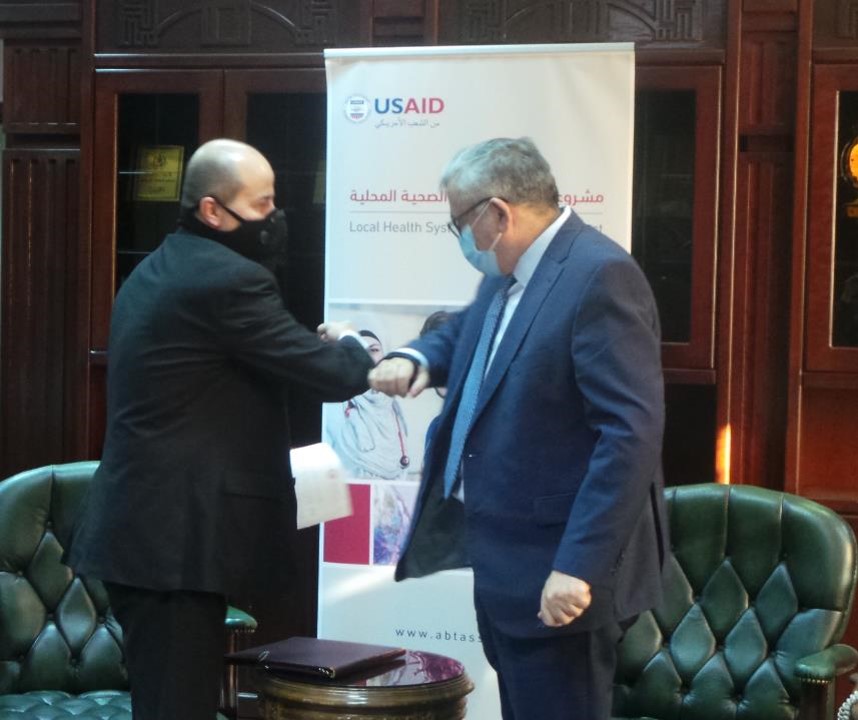
Resilience
In health systems, resilience is the ability to pivot and respond in the face of new health shocks and is a crucial ingredient in long-term health system strength. That’s why when LHSS was asked to support emergency responses to COVID-19 in Central Asia, the Middle East, and Latin America, it developed solutions and surge support that would leave health systems better prepared for the next health emergency.
When LHSS works with countries to build resilience, the types of assistance vary with a country’s needs. We supported USAID’s investment in the lab infrastructure for RT-PCR, genomic sequencing, and mass spectrometry across Central Asia, where these technologies can help detect and combat COVID-19, genomic variations, antimicrobial resistance, and other pathogens. In Colombia, we helped develop ways for subnational governments to surge human resources in emergencies. We supported Jordan’s Ministry of Health in developing a database of private-sector providers willing to deliver COVID-19 care at public sector hospitals during peak demand and strengthened quality improvement approaches to critical care. The goal: use COVID-19 challenges to imagine more resilient national health systems in the future.
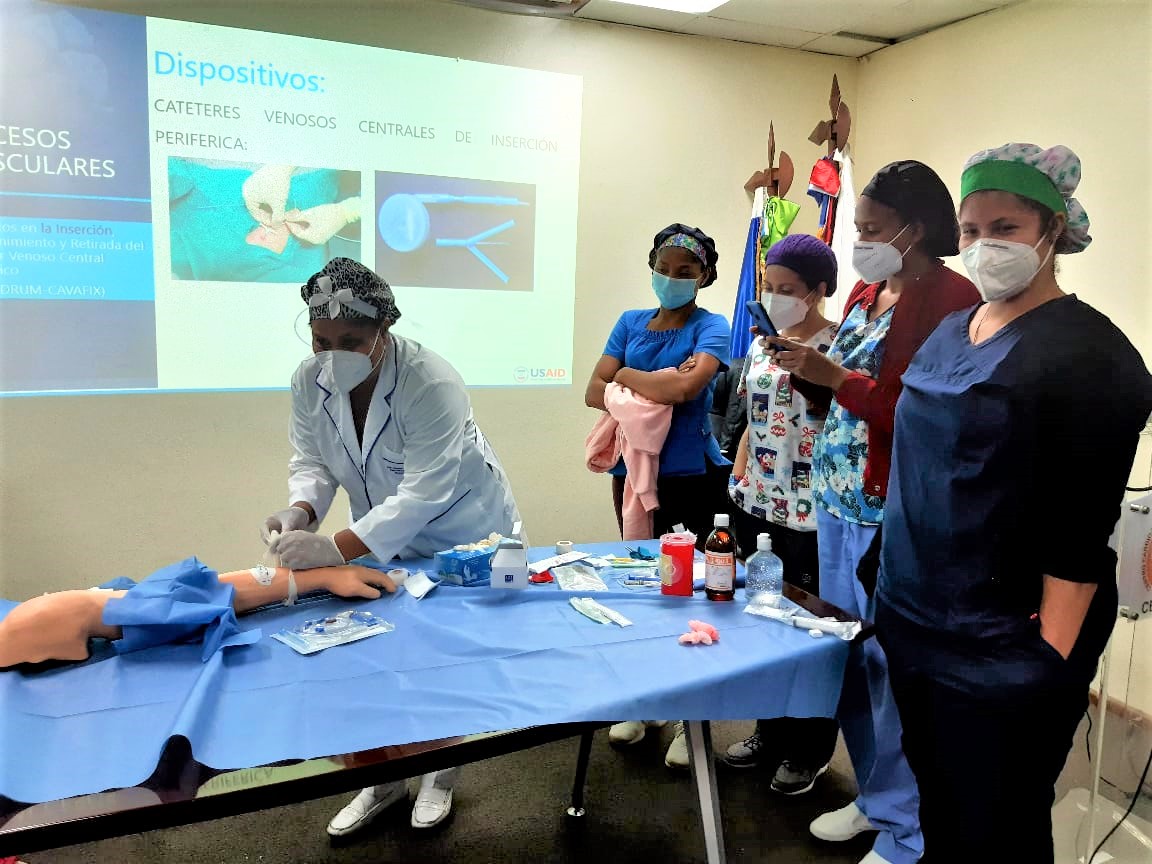
Quality care
As well as improving quality of services in-country, we also have worked with USAID on global approaches. A survey of 39 USAID priority countries examined their governance mechanisms for improving quality of care. National health leaders feel confident about using quality improvement methods, interventions, and indicators. The survey also found high levels of national leadership commitment and stakeholder engagement. But leaders face challenges in nurturing a culture of continuous quality improvement. Many countries lack reliable health management information and data systems. And they haven’t fully integrated the private and public health sectors or aligned standards and approaches for national, regional, and local providers.
In the Dominican Republic, LHSS collaborated with the Servicio Nacional de Salud (National Health Service) to promote high-quality clinical care and treatment for critically ill COVID-19 patients, including pediatric cases. We worked with the Servicio Nacional de Salud to develop standard operating procedures that meet national and World Health Organization guidelines. We also co-developed critical care training for health workers. The Servicio Nacional de Salud adopted the procedures and training curriculum, and LHSS has coordinated training for 1,640 health workers and trainers.
Health resources
Countries face rising demand for health services, extra pressure from COVID-19, and often reduced external funding. So LHSS helps national governments strengthen domestic financing for health and increase efficiency. Among the approaches: transferring funding for HIV and TB treatment from donor sources to the national social health insurance program and introducing new medicine procurement processes—tactics used in Vietnam. In Colombia, we help partners integrate migrants into national health systems, thereby enabling them to use routine primary health care services rather than costly emergency services. We are helping Cambodia fund half of HIV programs through domestic sources by 2023 by strengthening resource allocation and budget execution. We also supported restructuring the hospital nurse workforce in Kyrgyz Republic, resulting in better care for COVID-19 patients with the same number of nurses—thereby sparing the country costly increases in the size of the workforce. And LHSS’s malaria control work is finding ways that countries can increase private sector investments to accelerate progress against this deadly disease.
Workforce Restructuring Leads to Improved Efficiency and Better Quality of Care in Kyrgyz Republic
PROJECT: Local Health System Sustainability Project
CLIENT: U.S. Agency for International Development (USAID)
![]()
Strengthening Public-Private Health Sector Integration for Better Care
Two decades ago, donor investments in health care in low- and middle-income countries focused primarily on government-run public health systems. The private health sector was an afterthought.
But in 2004, the Abt-led Private Sector Partnerships-One project, funded by the U.S. Agency for International Development (USAID), began to drive a shift in how donors and governments understood the private health sector. We recognized that government efforts alone were unlikely to achieve desired improvements in health outcomes. Even with donor support, the public sector lacked the resources to serve their entire populations. In addition, women, men, and children of all backgrounds already sought care from private drug shops, pharmacies, clinics, and hospitals. For example, recent analysis showed that 42 percent of caregivers in 24 USAID priority countries used private providers for care for sick children, and 35 percent of family planning users in 36 USAID priority countries went to the private sector for contraceptives.
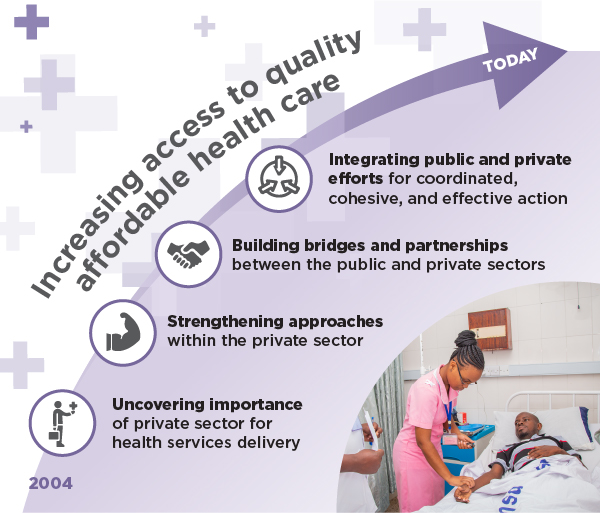
Through three successive USAID-funded global efforts, culminating in the Sustaining Health Outcomes through the Private Sector (SHOPS) Plus project, Abt helped stakeholders in 65 countries work with the private sector to increase access to quality, affordable healthcare. Over time, this work evolved from strengthening approaches within the private sector, to building bridges and partnerships between the public and private sectors, and finally to integrating public and private efforts for coordinated, cohesive, and effective action.
Data and evidence informed these efforts. If governments knew where private providers were located and which services clients preferred to access from private outlets, then they could better target their scarce resources to serve those most in need. That’s why Abt pioneered efforts to learn more about the private health sector and developed the Private Sector Assessment (PSA). PSAs build understanding of the size and scope of the private health sector. They highlight which types of services people seek from private providers and why, and what kinds of barriers private providers face to grow their practice and contributions to community health. The analysis enables policymakers to strengthen health systems based on the opportunities contained within their country contexts.
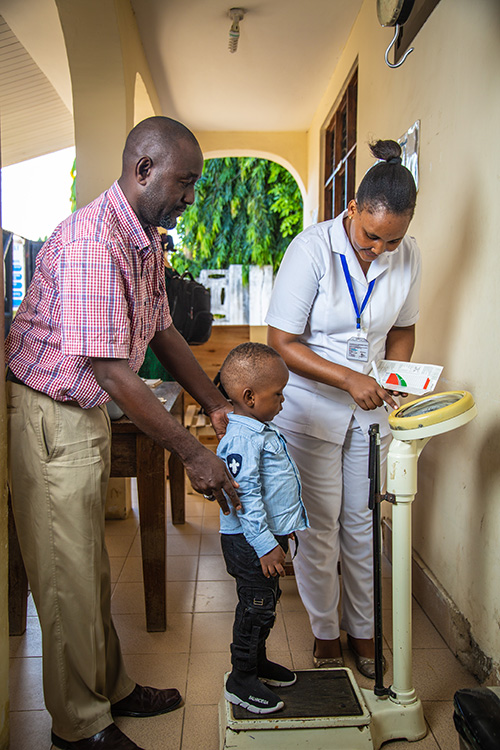
Consider Tanzania. In 2012, the health ministry was interested in public-private partnerships but lacked strategic insights to guide their plans. Abt led a PSA that helped stakeholders develop action plans in specific health areas. These plans shaped the next 10 years of donor and government investments. For example, to address HIV, SHOPS Plus supported policy changes that enabled the private sector to help introduce HIV self-testing into the country and private nurse-midwives to offer lifesaving antiretroviral therapy. To advance child health, we strengthened the ability of 1,300 accredited drug-dispensing outlets to serve as critical sources of treatments for diarrheal infections and fever. And to strengthen family planning (FP), we helped public and private suppliers share data to illustrate where subsidies could promote equitable access. In total, in Tanzania alone, our work helped revise 26 policies and supported private outlets to deliver almost 18,000 priority health services and over 400,000 priority health products.
In Senegal, the Ministry of Health had a similar objective. The public sector provided most health care services but knew it was neither efficient nor effective. SHOPS Plus conducted a private provider census to understand their geographic distribution, current contributions, needs, and challenges. This information helped the Ministry comprehensively integrate the private sector into the country’s drive toward universal health coverage and address targeted gaps in the healthcare system. Through clinical, financial, and policy support, SHOPS Plus helped private providers deliver 440,233 couple years of contraceptive protection; reached 3,190,737 people with healthy-behavior messages; and sold 621,543 long-lasting insecticide-treated nets to protect against malaria.
Nigeria has a large and active private health sector. It provides 61 percent of FP services. But more was needed to reach national goals: in 2018, only 12 percent of married women used modern contraceptives, well below the 36 percent commitment the government made as part of the global FP2020 Partnership. For the private sector, this meant increasing the range of methods that women could affordably access at private facilities. SHOPS Plus helped federal and state ministries of health and provider associations strengthen clinical skills and broker partnerships that increased access to quality, affordable family planning commodities. This work helped 931 public and private FP providers reach over 135,000 new users of family planning.
SHOPS Plus has improved health outcomes for millions of people, including...
PROJECT: Sustaining Health Outcomes through the Private Sector (SHOPS) Plus
CLIENT: U.S. Agency for International Development (USAID)
![]()
![]()
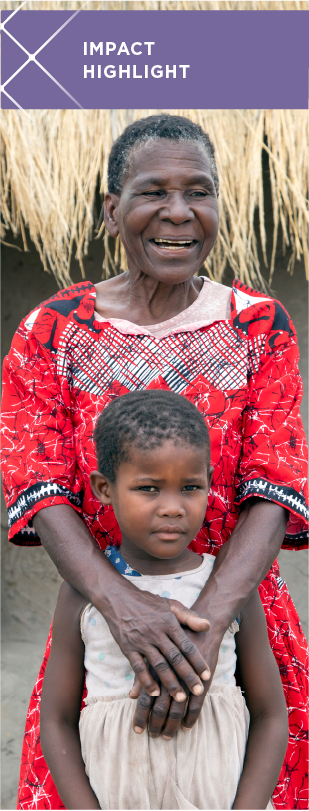
SUDAN: TACKLING NEGLECTED TROPICAL DISEASE
Neglected tropical diseases (NTDs) cause serious illness to more than one billion of the world’s poorest people. These diseases disable and disfigure people, cause serious stigma, ruin lives, and kill. Outside low- and middle-income countries, their names are little known: schistosomiasis, onchocerciasis, lymphatic filariasis, and visceral leishmaniasis. But their impact is devastating. Helping governments strengthen their health systems to control and eliminate these diseases is a public health priority.
In Sudan, Abt worked with the government to build a new Master Plan for the 15 NTDs causing illness and death in the country. Working with a multitude of stakeholders and ministries, we helped to bring together evidence-based findings and merge strategic directions to build the new approach for NTDs. The process included rigorous review and quality-assurance of data on the current epidemiological status for each disease. That wasn’t always easy. Sudan had to triangulate available data, which was imperfect, to make the best estimates of the current situation.
Through multiple rounds of stakeholder consultation for process-planning, technical work, consensus-building, and final review, stakeholders analysed systemic impediments and devised solutions to overcome them. Sudan adopted a clearer and more intuitive framework than the detailed and quite complex guidance that the World Health Organization (WHO) had issued. While simpler than the WHO approach, the strategy the government adopted and launched in September 2021 embraced cross-cutting aspects such as integration, health system capacity, and inter-sectoral collaboration.
The goal of the strategic framework is: accelerate to control, eliminate, and eradicate NTDs as public health threats in Sudan by 2030.
PROJECT: Accelerating the Sustainable Control and Elimination of Neglected Tropical Diseases (ASCEND)
CLIENT: U.K. Foreign, Commonwealth and Development Office (FCDO)
![]()
Maintaining Momentum for Malaria Eradication
When the COVID-19 pandemic hit, governments and the World Health Organization deemed malaria services essential so that preventable cases wouldn’t add to the burden on hospitals of COVID-19 cases.
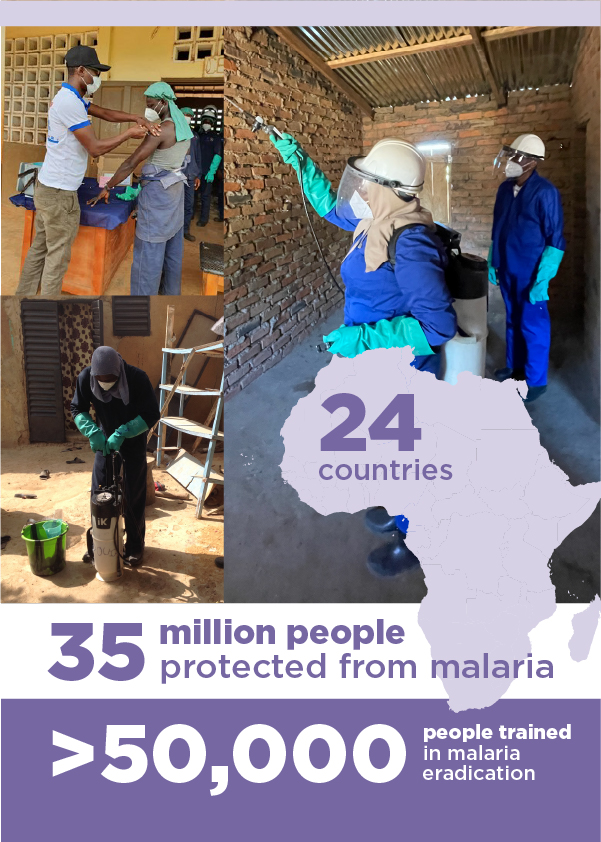
Despite government lockdowns and supply-chain disruptions, the U.S. President’s Malaria Initiative (PMI) VectorLink Project continued operations such as indoor residual spraying, distribution of insecticide-treated nets, and entomological research. In 2021, the project completed its campaigns on time and protected 35 million people in 24 African countries, Colombia, and Cambodia.
To achieve its goals, PMI VectorLink had to overcome a major challenge: protecting its workforce from COVID-19. The project quickly put new measures in place, such as adjusting spray procedures to maintain social distancing. But many country staffers risked contracting COVID-19 when they left work. It was critical to vaccinate as many as possible—and that meant overcoming wariness about injections.
In Mozambique, the national COVID-19 awareness team showed seasonal workers daily Ministry of Health statistics on the number of infections and deaths and explained how vaccination could help. The information persuaded 1,496 seasonal workers to get vaccinated. In Zambia, Nchelenge District Public Health Officer Kadolo Muntanga spoke to prospective spray operators on Kilwa and Chisenga islands about COVID-19 prevention. All 59 seasonal workers chose to be vaccinated with vaccines that PMI VectorLink boats brought to the islands. “In situations of disease outbreaks, sending health staff from the mainland to the two islands is a logistical challenge and expensive,” said Muntanga. “We are grateful to VectorLink for partnering with the district on last-mile delivery of COVID-19 vaccines.”
PROJECT: U.S. President’s Malaria Initiative (PMI) VectorLink
CLIENT: U.S. Agency for International Development (USAID)
![]()

MISSION IMPACT REPORT 2022: Explore
OUR WORK: Overview | Good Health | Economic Security | Effective Governance | Equity & Inclusion | Thriving Environment
OUR PEOPLE AND OPERATIONS: Overview | Employee Wellness | Financial Health | Ethics & Governance | Equity as Our Cornerstone | Environmental Responsibility
OUR COMMUNITIES: Overview
